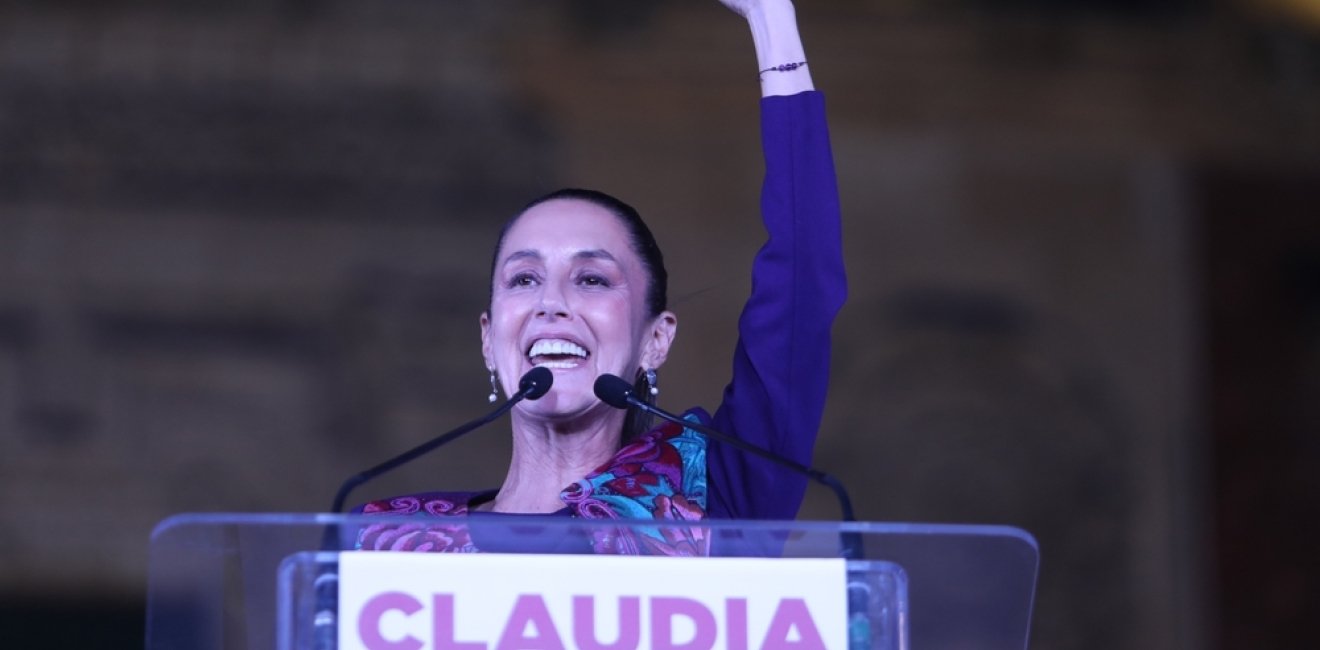On June 2nd, Claudia Sheinbaum, the Sigamos Haciendo Historia candidate, was elected president, making history as the first female to hold Mexico's highest elected office. While Sheinbaum's campaign platform and initial comments following her recent election closely reflected the current policy priorities of her predecessor and founder of the political party, Morena, Andrés Manuel López Obrador, much is to be determined about how a Sheinbaum presidency will impact Mexico. Eight experts share their perspectives on how Claudia Sheinbaum may impact the country's trajectory from security and rule of law, to distribution of wealth, migration, and relationship with the private sector.
How do you foresee the Sheinbaum presidency impacting the US-Mexico relationship?
By: Ambassador Earl Anthony Wayne
US-Mexico relations will be tough to manage for the months ahead and could become more challenging to guide depending on the outcome of the November US elections. Yet, there is reason to be hopeful that Claudia Sheinbaum will bring a reasoned and better-coordinated approach to engaging with the United States.
On a very basic level, current president Andres Manuel López Obrador (AMLO) regularly focused on feeding his domestic audience with morning press conferences during which he would often ad-lib his response to many controversial issues including those involving the US: a DEA statement about fentanyl, the State Department’s Human Right’s report, a critical New York Times article, or a grating statement by a member of the US Congress. President Sheinbaum will certainly defend her views and Mexico’s positions, but she does not appear to be as confrontational as her soon-to-be predecessor.
Those who have worked with her over the years say Sheinbaum’s approach to dealing with problems tends to reflect the scientist she was trained to be -- methodical and listening seriously to a range of options. These terms rarely apply to AMLO, despite being a very skilled politician. Her problem-solving approach should establish a good basis for working through difficult issues on the US-Mexico agenda, including on cross-border crime, migration management, and trade.
Unlike AMLO, who tends to view the US through the lens of Mexican domestic politics, Sheinbaum and her family members have lived in the US and know its strengths and weaknesses. This should give her and US counterparts a better opportunity to find shared solutions or identify additional channels for collaboration on big issues that arise, or at a minimum to better understand why the US may be “unreasonable.” Yes, this happens.
Sheinbaum understands that the key for Mexico’s continued growth and prosperity is to stay locked into the mutual production and value chains of North America. This will open opportunities for Mexico’s small and medium enterprises and attract job-creating investment and nearshoring. Sheinbaum has also already indicated an openness to pursuing renewable energy and partnering with the private sector from the US and elsewhere to attract the funding needed to develop these options for Mexico.
In tackling public security and crime, Sheinbaum demonstrated during her tenure as Mexico City mayor that she supported establishing good policing and sound capacity building to get the criminals off the streets. Her public security team worked well with US counterparts, which bodes well for better bilateral cooperation going forward. This is desperately needed.
Problems and differences will remain, but I am optimistic about the prospects for good collaboration.
How do you foresee the Sheinbaum presidency impacting security and rule of law in Mexico?
First and foremost, the administration should not underestimate the magnitude of the challenge they face. Even with a slight decrease, the homicide rate in Mexico of 25.4 per 100,000 is well above the Latin America average of 15.8 per 100,000, which is the highest in the world. The forensic crisis of unidentified remains and over 100,000 disappearances is further deteriorating without meaningful resources to address it and there is a well-documented expansion of protection rackets targeting the private sector that could negatively impact nearshoring ambitions.
Per her campaign statements, President Sheinbaum will continue using the Armed Forces for the provision of public security in Mexico. This is concerning because there is robust evidence that shows that this, in fact, undermines citizen security and can result in Human Rights violations, particularly for women and girls. Worryingly, the continuous militarization of public security is not a concern for the average citizen, and I believe the Sheinbaum administration will take advantage of this. Per the Survey of the Quality of Democracy in Mexico, in 2024, 69% of the population feels “safe” or “somewhat safe” using the Armed Forces against organized crime even if 51% think the Armed Forces cut deals with criminal groups and 40% do not think the Armed Forces are held accountable by civilian institutions. Importantly, the Armed Forces will likely capitalize on these high levels of trust, even if there is also perceived corruption within their ranks, to continue pushing for expanded budgets and resources to the detriment of developing civilian institutions for public security in Mexico.
How do you foresee the Sheinbaum presidency impacting relations with the private sector in Mexico?
By: Gustavo Almaraz and Mariana Raphael
A Sheinbaum presidency in Mexico is poised to shape relations with the private sector through a blend of pragmatism, technical expertise, and political dynamics. Known for her openness to dialogue with businesses, Sheinbaum has a track record of fostering public-private partnerships, particularly in infrastructure and environmental initiatives during her tenure as mayor of Mexico City. This inclination suggests a collaborative approach that could benefit sectors aligned with her agenda, such as renewable energy and sustainable development.
Her technical background and reliance on well-prepared advisors indicate a methodical approach to governance, likely bringing stability and predictability to regulatory frameworks. This could reassure investors and encourage long-term planning among businesses.
However, navigating the USMCA review in 2026 will be crucial. Sheinbaum will need to balance Mexico's international trade commitments with domestic policy priorities, particularly in sectors like automotive manufacturing and agriculture.
The influence of President Lopez Obrador remains pivotal. If allowed to govern with her distinct style, Sheinbaum's presidency could chart a course characterized by proactive engagement with the private sector, leveraging her majority in Congress and at local levels to enact policies conducive to economic growth and social equity. This alignment of political support provides a strong foundation for effective governance, potentially fostering an environment where businesses thrive under a balanced regulatory framework.
Ultimately, while challenges and opportunities will arise, Sheinbaum's presidency has the potential to redefine private-sector relations in Mexico through collaboration, technical expertise, and strategic governance.
How do you foresee the Sheinbaum presidency addressing the challenges of migration?
By: Carlos Heredia
Mexico militarized its immigration policy during AMLO’s term (2018-2024), heavily influenced by U.S. national security concerns. The promised humanitarian approach to migration and human rights never materialized. The total impunity of high government officials after the incineration of 40 migrants in a government facility in Ciudad Juárez on March 27, 2023, is AMLO’s legacy: migrants in transit through Mexico are used as a bargaining chip to be traded away for political expediency.
With significant assistance from the United Nations, asylum and refuge were the only responsibilities that this government seemed to deliver, but that department was permanently understaffed and underfunded.
President Biden’s June 5th, 2024 decree to unilaterally redefine asylum and refuge will bring a larger number of asylum seekers stranded in Mexico, where significant segments of our territory are controlled by organized crime.
Ironically, while some in Mexico, the United States, and Canada describe North America as the most competitive region in the world, the rights of Mexican undocumented migrants in the U.S. are not guaranteed. Now that the three countries experience a shortage of workers, a blueprint to regulate labor mobility is needed, even against the political odds.
Future president Sheinbaum says she will address the root causes of migration in Mexico and the region, but key officials in her administration starting October 1st, are already discussing the continuity of militarized immigration containment. Her huge victory at the polls means no incentive for change, so beyond the speeches, I do not foresee a departure from current practices.
How do you foresee the Sheinbaum presidency impacting Mexico's energy sector?
By: Alejandra León
Claudia Sheinbaum approaches energy with a distinct perspective from the current administration. While many perceive her policies as a continuation of López Obrador's, her true focus lies in expediting the energy transition. Her rhetoric suggests a continuation of the existing energy policy for the next six years, including controlled increases in gasoline, electricity, and LPG prices, strengthening of Pemex and CFE, maintaining 54% power generation by CFE, upgrading existing refineries, utilizing the Olmeca refinery for self-sufficiency, advancing Plan Sonora, and refraining from fracking for hydrocarbon production. However, Sheinbaum's rhetoric also highlights her commitment to energy transition through the construction of renewable plants, distributed energy systems, solar heaters for residential and commercial use, support for petrochemicals and fertilizers, and the promotion of electromobility in major cities. The logic behind this rhetoric is a topic for another debate.
Nonetheless, Sheinbaum acknowledges the reality that replacing hydrocarbons within a six-year timeframe necessitates substantial financial resources. Not only must new energy supplies be built, but consumers must also be incentivized to make the switch. In the best-case scenario, she can meet the expected moderate growth in energy demand with clean energy sources. However, securing private capital efficiently remains a challenge. It is crucial to avoid corruption, obtain cost-efficient technology in a timely manner, and comply with the restrictions imposed by commercial partners. Furthermore, the investment synergy resulting from the 2013 energy reform has largely dissipated. Of note, China is the leader in the supply chain of renewable energy and electromobility; increasing trade and investment from China will increase economic risk during the USMCA revision in 2026. Between 2016 and 2023 Mexico increased an average 6% per year its exports to the US, the same growth rate as Mexican imports from China.
Considering these factors, it remains unclear how Sheinbaum intends to achieve sufficient, affordable, and clean energy to benefit the Mexican population and enhance Mexico's competitiveness. There are significant obstacles to overcome in realizing her vision.
How do you foresee the Sheinbaum presidency impacting pending plans for judicial reform?
Reform to Mexico’s judicial system has been a significant priority for AMLO, but previous efforts have not been successful. Yet, given Morena and its allies’ dominance in both chambers of Congress, AMLO has promised to present the proposed judicial reform to the newly-elected Congress in September, before he leaves office on October 1 – a final act of his presidency. Though the exact nature of the judicial reform is evolving (it is certain to include the direct, popular election of members of the judicial branch – scale and scope to be determined), and whether the legislation will ultimately pass is still undecided, mere discussions of the pending reform have already had implications, such as the peso’s nearly 2% drop in value following Sheinbaum’s comments promising to pursue the reform shortly after the election.
The passage of this reform would further politicize Mexico’s judicial branch, incentivize actions that favor popularity, rather than judicial wellbeing and expertise, and would do little, if anything, to address issues of corruption – the purported primary purpose of the reform. Not only would the passage of the judicial reform represent a direct threat to democracy and rule of law in Mexico, but more concretely, it would also have significant implications for the country’s competitiveness, particularly when it comes to foreign investment. Both current and former US government officials have commented that the passage of this reform would undoubtedly affect the US-Mexico relationship, particularly as the USMCA’s 2026 review looms on the horizon. Sheinbaum, for her part, has sought to assuage concerns about the pending reform, emphasizing the strength of Mexico’s economy and also promising to hold public consultations throughout the summer on the judicial reform – though AMLO has already said that the reform will be approved in September.
How do you foresee the Sheinbaum presidency addressing the challenges of climate change and the environment?
By: Tania Miranda
Claudia Sheinbaum, an engineer and climate scientist, is viewed by many as the President who will finally prioritize climate change on Mexico’s national agenda. As the country grapples with climate emergencies, including heat stress, water scarcity, and devastating hurricanes, the need for decisive action has never been more urgent. However, her alignment with her predecessor's rhetoric may pose challenges for Mexico's first female President.
Despite the importance of biodiversity in a megadiverse country like Mexico, it is noticeably absent from Sheinbaum's plans. Her campaign platform mentioned biodiversity only once, in the context of food sovereignty. There was no reference to natural protected areas (NPAs), and the environmental section focused mainly on water basin recovery and water access, with only a brief mention of reforestation and forest protection. Moreover, she supports the Tren Maya infrastructure project, which threatens important biodiversity hotspots of the Yucatán Peninsula.
On a positive note, Sheinbaum appears committed to expanding renewable energy sources and distributed generation. She also plans to invest in the decarbonization of the transportation sector through electromobility, which could significantly improve air quality and mitigate climate change, as the energy sector—including power generation and transportation fuels—accounts for over 60% of the country’s CO2 emissions. However, energy is just one part of the equation. In Mexico, 36% of CO2 emissions and the majority of other potent greenhouse gases (GHGs) originate from other sectors, such as agriculture and livestock.
Sheinbaum is expected to continue supporting the national utility CFE and the national oil company Petróleos Mexicanos, both of which lag in the energy transition and could divert valuable resources. Additionally, she will need to decide whether to permit the expansion of U.S.-owned LNG export terminals along Mexico’s coasts, which could substantially increase GHG emissions.
Given her involvement in drafting key UN climate reports, it is assumed that she will take Mexico’s international climate commitments seriously, including the Paris Agreement’s Nationally Determined Contributions and the 30x30 goal from the Global Biodiversity Framework. Her cabinet appointments and Mexico’s participation in upcoming biodiversity and climate summits this October and November will provide insights into her environmental agenda. We will see what tomorrow brings, but it is the responsibility of all of us working on climate issues to encourage her to move forward with the net-zero transition, in a political environment that moves in the opposite direction.
Authors




Associate Professor, Centro de Investigación y Docencia Económicas (CIDE)




Former Career Ambassador to Afghanistan, Argentina, and Mexico; Distinguished Diplomat in Residence, School of International Service, American University

Mexico Institute
The Mexico Institute seeks to improve understanding, communication, and cooperation between Mexico and the United States by promoting original research, encouraging public discussion, and proposing policy options for enhancing the bilateral relationship. A binational Advisory Board, chaired by Luis Téllez and Earl Anthony Wayne, oversees the work of the Mexico Institute. Read more

Explore More
Browse Insights & Analysis
Greenland’s New Governing Coalition Signals Consensus

The Future of France's Far-Right Party

Ukrainian Issue in Polish Elections



